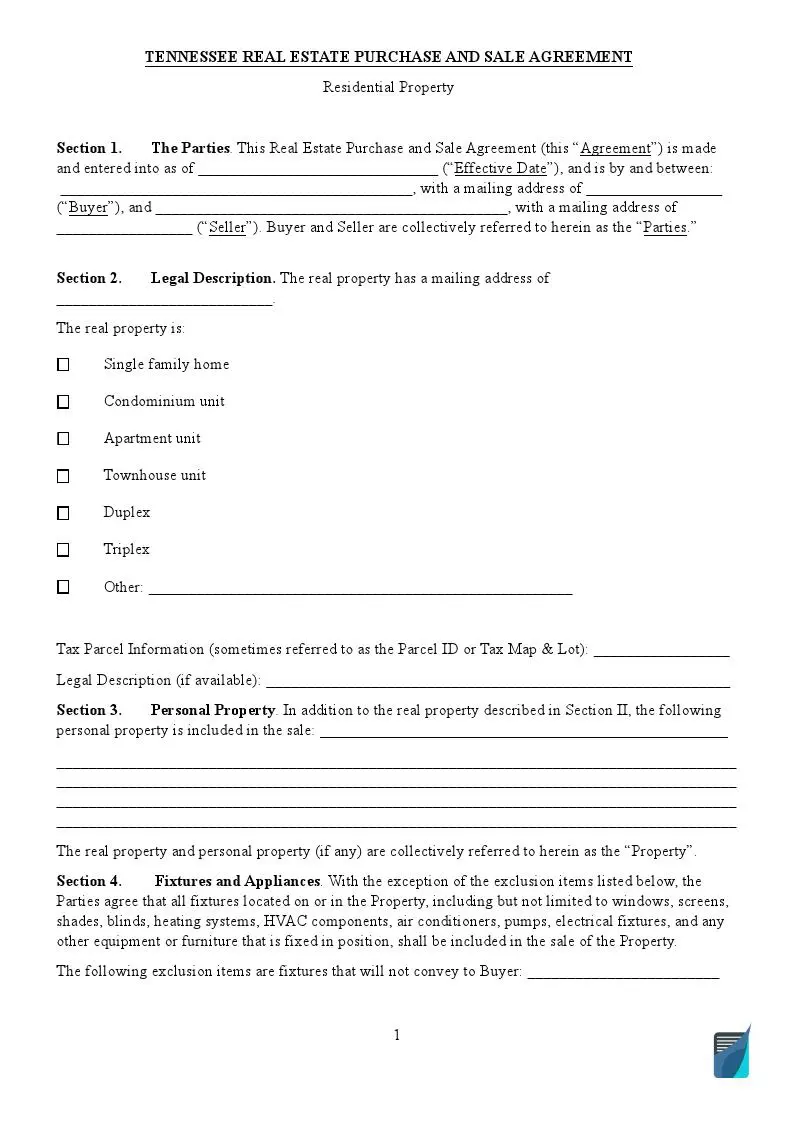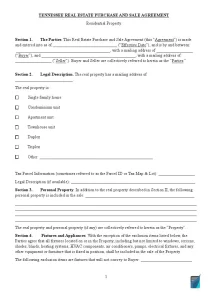Tennessee Real Estate Purchase Contract
Tennessee Real Estate Purchase Agreement is used for the purchase and sale of real estate. The signing of this document means that the parties (seller and buyer) have come to a single agreement. Usually, the signing is preceded by lengthy negotiations. The printable real estate purchase agreement is drawn up by the buyer, making an offer to the seller. The seller has the right to accept and refuse the transaction or make their adjustments and wishes, which will lead to negotiations.
In the article, we will talk about the main laws and requirements for residential and commercial property agreements, paying special attention to the issue of disclosure.

Build Your Document
Answer a few simple questions to make your document in minutes
Save and Print
Save progress and finish on any device, download and print anytime
Sign and Use
Your valid, lawyer-approved document is ready
Tennessee Residential Purchase and Sale Agreement
An agreement on the sale or purchase of residential real estate is an essential document that should be drawn up with great care. The document contains all the conditions and agreements between the parties, namely:
- Offer date (might be the same as the contract date)
- Seller’s full name and details
- Purchaser’s full name and details
- Amount of the earnest money deposit
- Real property description
- Additional items included as part of the property (appliances, furniture, equipment, etc.)
- Purchase price
- Financing terms
- Conveyance and title
- Inspections and property conditions
- Disclosures
- Closing terms
- Signatures
Usually, the parties prescribe the time allotted for negotiations in the contract. That is, the buyer can set a deadline for the proposal. If the seller does not accept the agreement until then, the buyer has the right to withdraw from the transaction without any sanctions imposed.
Separately, it should be said about the Inspection point. According to §66-5-202 of the TN Code in Tennessee, the buyer is entitled to receive a home condition report (which needs to be included in the contract). They can also inspect the dwelling unit they intend to purchase by hiring a certified professional. If the specialist identifies any additional defects, then several scenarios are possible:
- The seller removes the defects at their own expense
- The seller lowers the price of the house
- The parties do not come to a common decision and refuse to conclude an agreement.
It is best to prescribe all these conditions initially in the agreement, including the inspection period, a list of defects, and repairs that the seller agrees to perform.
Tennessee Commercial Purchase and Sale Agreement
This agreement differs from the previous document mainly because it deals with the purchase and sale of commercial real estate. Otherwise, everything is about the same—the buyer draws up an offer (the seller can also draw up the draft contract), and the parties discuss the agreement and sign the contract. Once the parties have appended their signatures, the contract will be considered legally concluded, and the parties must begin to fulfill their obligations.
In the case of commercial property, real estate agencies are almost always involved in the transaction. According to §62-13-405 of the TN Code, if an agency is involved in a transaction, it is obliged to disclose its status to individuals before performing any services.
Below we will tell you what other disclosures should be made when making a deal to buy and sell real estate in Tennessee.
Required Seller Disclosures in Tennessee
If you want to sell property in Tennessee, you are required by state law to disclose the condition of the home to the buyer. You must notify them in writing of all significant defects in the house, from a leaking roof to the use of toxic materials.
At first glance, it seems that such disclosure only works for the buyer. However, this is not entirely true. This statement will also save the seller from possible litigation. After all, if the buyer knew about the defect during the purchase, they cannot sue you. Disclosure can also attract more potential buyers because no one wants to buy a pig in a poke.
Each state has specific requirements as to what types of disclosures apply to real estate transactions. So, what are the typical disclosures in Tennessee?
1. Lead-Based Paint Disclosure
One of the most famous, as it operates in all states. 42 US Code §4852d requires this form to be made available to all potential buyers of pre-1978 homes. The fact is that the paint that was used included lead, which is toxic and dangerous to humans.
2. Residential Property Condition Disclosure
According to §66-5-201 to 210 of TN Code, the seller of residential real estate is obliged to provide the buyer with a document that will indicate all the existing defects of the house known to them. The words “known to them” are very important, because the seller is not obliged to hire a special commission or specialist to detect defects but simply fills out a form that is a table and answers “yes,” “no,” or “I do not know.”
You can use a suitable form either from your real estate agent or from the text of the law itself (§66-5-210 of TN Code). The document contains questions about legal issues and possible problems, and the condition of individual parts of the house.
It is important to mention that according to §66-6-207 of the TN Code, the seller has the right not to disclose certain information. It may include accidents or murders in the home. It is also unnecessary to report if prior residents had HIV/AIDS or other diseases not transferred through the house.
3. Waiver
In some cases, the buyer may refuse to receive the disclosure and buy the house “as it is.” By §66-5-202 (2), if the buyer has completed the Waiver, the seller does not have to report anything. There are several situations in which this would be appropriate:
- The acquired property will be demolished
- The transaction must be completed in the shortest possible time, and there is no time for inspection and disclosure
- Purchaser’s best hope to compete with other bidders
To Sum Up
Selling and buying real estate is bound to be stressful. Disclosure of information honestly can relieve you of it at least a little. This measure will bring you many benefits, such as:
- It will help build honest and trusting relationships. Buyers are more willing to trust the seller who honestly told them about all the defects in the house.
- Undisclosed information can lead to litigation, which means a waste of time and money. It is more profitable to fix defects than to pay fines.
- You will not break the law.
Hopefully, you can agree with us that these are sufficient reasons to conduct your business honestly and openly.
